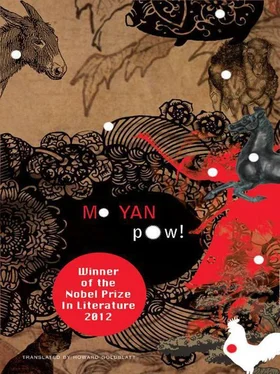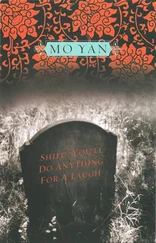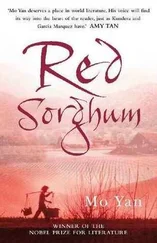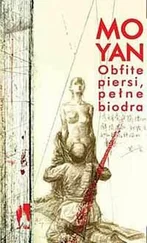The moon was out in all its glory that night, the air was fresh and clean and the peach trees sparkled as if varnished. Even the mule's hide seemed to glow. We fixed an old wooden frame to its back, tied three cases of mortar shells to each side and then set the seventh case on top. The old couple took care of the cases as if they had been doing this every day. The mule bore its burden stoically, its fate tied to the couple, almost as if it were their son.
We left the peach grove and headed down the road towards the village. Winter had begun to settle in, and though there was no wind the moonlight brought a chill to the air; a layer of frost painted the roadside plants a pale white. Off in the distance, someone was burning dead grass, creating an arc of fire like a red flood engulfing a sandy beach. The boy they'd sent to fetch me, who looked to be seven or eight years old, walked in front of us and led the mule along. He had on a tattered coat that nearly covered his knees, secured at the waist by a white electric wire. Barelegged and barefoot, his head a mass of wild hair, he had the spirit of a raging prairie fire. What was I compared to him? A corrupt youngster, a shameful degenerate. Time to pull myself together. This was too good an opportunity to let pass. I had to fire these forty-one mortar shells on this lovely moonlit night, rock the air with a series of explosions and cement my status as a hero of my age.
The old couple walked beside the mule, one on each side to steady the cases. He was wearing a shearling coat and a dog-skin cap, with a pipe behind his neck, a quintessential old-style peasant. She'd once had bound feet—now freed—and each raspy breath that broke through the surrounding silence let us know how painful every step was for her. I walked behind the mule, vowing to model myself on the boy up front, the old man and the woman and the me of my childhood. On this night, walking amid the icy moonbeams, I would fire my forty-one mortar shells, explosions that would shake heaven and earth and bring life to a village as dead as a stagnant pool. And I would keep the memory of this night alive. One day Luo Xiaotong would become a mythical figure, his tale passed down through the ages.
And so we walked through the wilderness, followed by a variety of inquisitive wild creatures. They shadowed us warily, their bright eyes like little green lanterns, as curious as a pack of children.
The pleasant, melodic tattoo of the mule's hooves told us that we'd entered the village on its concrete roadway. There were a few gleams of light. The village was quiet, the streets deserted. A village dog cozied up to the strange animals following us but was sent yelping into a nearby lane with a bite. Moonlight made the streetlights superfluous. An iron bell on the tall scholar tree at the village entrance, a relic from the commune days, looked dark green in the light. Once upon a time its every peal had been a command.
Our entry into the village went unnoticed but we would not have been deterred even if it hadn't. No one would have imagined that our mule carried forty-one mortar shells; if we'd tried to explain, they'd just have been even more convinced that Luo Xiaotong was a ‘powboy’. In my village ‘pow’ also meant to brag and to lie. Children who boasted and who shot off their mouths were called powboys. That nickname didn't cause me any shame, though. It actually made me proud. Our revolutionary leader Sun Yat-sen bore the resounding nickname of Big Pow Sun, though he'd himself never fired a gun. Luo Xiaotong was about to surpass Sun Yat-sen in that regard. The weapon was ready for action, carefully hidden at home where I'd babied it by restoring every part to its original condition. The shells seemed to have dropped from the skies, each smeared with grease, awaiting only a careful cleaning to shine. The mortar tube called out for the shells; the shells longed for the tube, just as the Wutong Spirit called out for beautiful women, who in turn longed for it. Once I'd fired my forty-one shells, I'd be a powboy of legend, a part of history.
An unlocked gate allowed us entry into our yard, where we were welcomed by dancing weasels. I knew that my yard was a weasel playground now, a place where they fell in love, married and multiplied in numbers sufficient to keep out scavengers. Weasels have a charm that women find irresistible; they make them take leave of their senses and provoke them into singing and dancing and, in some cases, even running naked down the street. But they didn't scare us. ‘Thanks, guys,’ I said to them, for guarding the mortar for me. ‘You're welcome,’ they replied. Some wore red vests, like runners on the stock-exchange floor. Others had on white shorts, like children at a public swimming pool.
First we took apart the mortar in the side room and carried the parts into the yard. Then, after leaning a ladder against the eaves of the westside room, I climbed onto the roof. The roof tiles on the neighbourhood houses glinted in the moonlight. I could see the river flowing behind the village, the open fields in front and the fires burning in the wild. I couldn't have asked for a more opportune moment. Why wait? I asked my companions to tie each part with a rope, and tie it well, so that I could then haul it up onto the roof. I removed a pair of white gloves from the tube, put them on and then swiftly reassembled the weapon; before long, my very own mortar crouched on the roof, gleaming in the moonlight, like a bride emerged from her bath and waiting for her new husband. Pointed into the sky at a forty-five-degree angle, the tube seemed to suck up the moonbeams. Several playful weasels climbed up beside me, scurried across to the mortar and began to scratch at it. They were so cute that I didn't stop them. Had it been anyone else I'd have thrown them off without a second thought. Then the boy led the mule up to the foot of the ladder and the old couple unloaded the cases, moving with precision and confidence. Even one shell dropped to the floor would have meant disaster. Each case was tied with rope; I hauled them up, one at a time, and then laid them out on the roof. That done, the old couple and the little boy climbed up to join me. The woman was gasping for breath by then. She suffered from an inflamed windpipe, and I knew she needed to eat a turnip to feel better. If only we had one. ‘We'll take care of that,’ one of the weasels said. Before long, eight little creatures scrambled up the ladder, chanting a rhythmic hi-ho, carrying a turnip two feet long and with a high water content. The old man rushed up to lift it from the weasels’ shoulders and hand it to his wife. Then he thanked them profusely, a manifestation of the common man's simple manners. The old woman broke the turnip in half over her knee, laid the bottom half beside her, took a crisp bite out of the top and then began to chew, suffusing the moonbeams with the smell of turnip.
‘Fire a round!’ she said. ‘Eating a turnip dipped in gunpowder smoke will cure me. Sixty years ago, when my son was born, five Japanese soldiers shot a mortar in our yard, sending gunpowder smoke in through the window and into my throat, damaging my windpipe. I've had asthma ever since, and my son was so badly shaken by the explosions and choked by the smoke that it weakened his constitution and killed him.’
‘The five men who did that got the death they deserved,’ continued the old man. ‘They killed our little cow, then chopped up and burnt our furniture to make a fire to roast it in. But it was only partially cooked, and they all died of salmonella poisoning. So we hid the mortar in the woodpile and the seven cases in a hollow between the walls. Then we escaped up Southern Mountain with our son's body. Later, people came looking for us, calling us heroes for poisoning the meat of our cow and killing five of those devils. We weren't heroes—those devils had had us shaking in our boots. And we certainly hadn't poisoned the meat. The sight of them writhing on the ground had brought us no pleasure at all. In fact, my wife, who was still ill, had boiled a pot of mung-bean soup for them. Usually that's a good cure for poison but theirs ran too deep in their bodies and they could not be saved. Years later, another man showed up and insisted we admit to killing them. A militiaman, he'd stabbed an enemy officer in the back with a muck rake while he took a shit. He'd then taken the man's pistol, twenty bullets, a leather belt, a wool uniform, a pocket watch, a pair of gold-rimmed glasses and a gold Parker pen, and turned it all over to his unit. For that he'd received a second-class merit award plus a medal he wore pinned to his chest and refused to take off. He told us to turn over the mortar and the shells but we refused. We knew that one day we'd meet up with a boy who'd fall in love with it and who'd continue the work we'd begun at the cost of our son's life. A few years back we sold the mortar to you as scrap because we knew you'd treasure it. Dealing in scrap was only a pretext for us. Our greatest desire has been to help you fire these forty-one shells, avenging what you lost and establishing your honoured name. Don't ask what brought us here. We'll tell you what you need to know, nothing more. And now, son, it's time.’
Читать дальше












